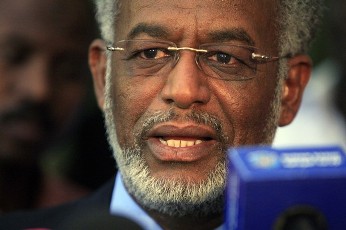Karti reminds Kerry of US pledge to remove Sudan from terrorism-sponsoring states
August 29, 2013 (KHARTOUM) – The US secretary of state John Kerry phoned his Sudanese counterpart Ali Kart on Thursday to officially inform him of president Barack Obama’s decision to appoint ambassador Donald Booth as his special envoy for Sudan and South Sudan.

It noted Booth’s experience with African affairs given his tenures in Ethiopia, Liberia and Zambia.
According to Sudan’s official news agency (SUNA), Kerry told Karti that the new envoy will be tasked mainly with helping resolve outstanding issues between Sudan and South Sudan, as well as improving bilateral relations between Washington and Khartoum.
The top Sudanese diplomat expressed hope that Booth will focus on steps to normalise ties that would eventually result in the Obama administration fulfilling previous pledges to remove Sudan’s name from the list of states that sponsor terrorism and lift economic sanctions.
Prior to South Sudan’s referendum on statehood in early 2011, Washington promised Khartoum to delist Sudan from terrorism-sponsoring states if it facilitates the vote and allows it to be conducted peacefully.
South Sudanese voted overwhelmingly in favour of creating their own state and Sudan was the first country to swiftly to recognise their new neighbour.
But conflicts that emerged later in Abyei, South Kordofan and Blue Nile prompted the US to shy away from its earlier promises much to the frustration of Sudanese officials.
Sudan was placed on the US terrorism list in 1993 over allegations it was harbouring Islamist militants working against regional and international targets. Despite close cooperation on counter-terrorism issues over the past decade which Washington repeatedly acknowledged, Khartoum has remained on the blacklist.
Sudan has also been subject to comprehensive economic sanctions since 1997 over terrorism charges and human right abuses. Further sanctions, particularly on weapons, have been imposed since the 2003 outbreak of violence in the western Darfur region.
Neither the White House nor Kerry made any reference to the prospects of lifting sanctions on Sudan in their statements regarding Booth’s appointment.
Kerry in particular appeared to stress the longstanding dispute between Khartoum and Juba over post-secession issues.
“None of those brave people [in South Sudan] voted to create a failed state or to return to the violence that has plagued their home for too long. If both states put their people first by governing inclusively and democratically, protecting human rights and creating economic opportunity, they can make progress on realising the future their people deserve. This is a decisive period”, Kerry said in a statement released on Wednesday.
“Khartoum and Juba can choose the path of peace and prosperity, or they can go backwards,” his statement added.
Kerry described US involvement in the region, particularly efforts towards gaining South Sudan’s independence had been a “deeply personal” experience for himself, as well as president Obama and US ambassador to the United Nations Susan Rice.
“I’ve seen first-hand how invested the president and his administration have been in the work to help move the region forwards. When I was a senator, I had the privilege of supporting the diplomatic effort that led to South Sudan’s independence, and on the ground leading up to the historic referendum I witnessed the long lines of people voting for a better way of life”, he said.
Khartoum and Juba have long been at loggerheads over accusations that he former is backing rebels in Sudan’s South Kordofan and Blue Nile border states. Juba denies the charges.
Last June, Sudanese president Omer Hassan Al-Bashir ordered the closure of pipelines carrying oil from landlocked South Sudan, amid allegations of ongoing rebel support. South Sudan has just resumed pumping oil after a year-long suspension following a dispute with Sudan over transit fees.
China and the African Union (AU) have persuaded Bashir to delay the decision until early September while they work on verifying claims of rebel support and getting the two sides to agree on borders security measures and the creation of a demilitarised zone.
However, talks appeared to hit a snag recently, with Khartoum accusing Juba of non-cooperation in the joint talks held so far.
Sudan has long maintained that security arrangements must precede implementation of other deals signed last year, such as ones related to citizenship and trade.
Another growing concern for the US in recent months is rising insecurity in South Sudan, in particular fighting in Jonglei state which has led to mass killings and reports of human rights abuses by government troops.
Adding to this is a political crisis within South Sudan’s ruling party (SPLM) that led to the sacking of president Salva Kiir’s long-time deputy Riek Machar and the suspension of other senior officials pending investigations into alleged financial and political wrongdoings.
(ST)
